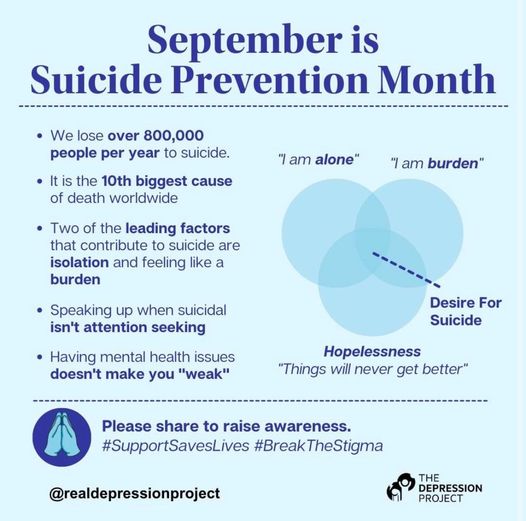Suicide Prevention Week
Trigger warning: suicide
Suicide is not a topic many people are comfortable talking about, for various reasons. This is also why Suicide Prevention Awareness is so important, to destigmatize suicide and to provide education and valuable resources. September 4th through September 10th is designated as National Suicide Prevention week, while the month of September is designated as Suicide Prevention Awareness Month.
(800,000 deaths a year worldwide)
Suicide, like heart disease and cancer, is a leading cause of death in the United States. In 2020, nearly 46,000 people died by suicide in the US alone. In response to the rate of suicide in the US, every state began implementing the phone number “988” as the new Suicide Prevention Lifeline on July 16th, 2022 in hopes of increasing accessibility to the lifeline for those in need. The previous number, 1-800-273-8255 (TALK), will still be available to those in emotional distress or crisis.
Many people feel helpless when they know a loved one struggling with suicidal thoughts. It is a nuanced and complex topic, but there are a few ways you can help support those you love who may be struggling. Continue reading for some signs and risk factors that help you know when someone might need your help or support.
Concerning Comments
Sometimes individuals who are thinking about suicide might make comments about wanting to die. While bringing up wanting to die does not mean someone is suicidal, it is worth taking note of those comments and following up with that individual to check in. Other times an individual might make comments about not having a reason to live or feeling like a burden to those around them. These comments can sound like “You don’t need me anymore” or “It would be easier if I just wasn’t here.”
If you hear these comments, validate their feelings first, then let that person know they are valued and important. Emphasize that they are not a burden and check in to see what they might be struggling with. Offering a listening ear can make a huge difference and help them feel less alone.
Mood and Behaviors
Often, those struggling with suicidal thoughts have an overwhelming feeling of hopelessness. This means that they might have difficulty seeing a future without their current pain or struggles. Hopelessness can look like decreased motivation, low energy level, and low or depressed moods. The feeling of hopelessness can be incredibly isolating, which also contributes to the feeling of being “alone” or that their friends and family “won’t understand the way they feel.” In response to some of these feelings, individuals might self-isolate by staying in more often or turning down social invitations that they previously would have accepted.
Some behaviors that go along with suicide or suicidal ideation are giving away cherished belongings, insomnia or hypersomnia, and acting anxious or agitated. These behaviors do not mean someone will act on a suicidal ideation, but are just behaviors to be aware of.
If a loved one is exhibiting some of these moods and behaviors, check in on them. Again, offering a listening ear can go a long way.
Access to Lethal Means
Finally, access to lethal means, like guns, drugs, or other potentially harmful items, is a large factor in suicide. You might see someone increase their interest in one of these lethal means or talk about them more than they did previously. If you know someone is in imminent danger, do not hesitate to call 911.
If you notice any of these comments, moods, or behaviors in someone you know, don’t be afraid to ask them questions. Checking in with them to see how they are feeling and what they are struggling with can help you determine if they are having thoughts about suicide. It is also important to note that while asking about suicide can be uncomfortable, it will not directly cause someone to be suicidal. While you can validate the way they feel and let them know they are not alone, connecting an individual struggling with suicide to a professional is the most important thing. You can find other important resources below that might be helpful to someone you know.
Important recourses:
Dial 988 for the Suicide Prevention Lifeline
Dial 1-800-273-8255 (TALK) if you are in an emotional crisis
Crisis Text Line: Text “Hello” to 741741
YouthLine: (ages 11-21): Text “teen2teen” to 839863, or call 1-877-968-8491

